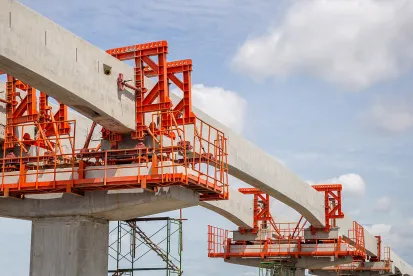Over the next five years, the federal government expects to spend over a trillion dollars on a wide range of infrastructure projects, including road widenings, bridge repairs, and upgrading mass transit and the power grid (to name a few). Some projects will require the government to exercise its power of eminent domain to take private property to create new right-of-way access or expand existing access rights.
Franchisors and franchisees need to pay particular attention to road widening and bridge improvement projects since they often involve modifying highway access and installing sidewalks. These projects often negatively impact driveway access and on-site maneuverability and may result in the loss of parking spaces. Also, franchisors and franchisees need to review the condemnation clause in their real estate leases to know what rights they have, if any, when it comes to changes to the site caused by the government’s project. Condemnation clauses in leases are rarely negotiated and often overlooked by the parties.
When the government acquires the entire property owned by a private property owner, the taking is a “complete taking.” However, for many infrastructure projects, the government only needs part of the property, resulting in a “partial taking” of property. This article will focus on partial takings.
When the government seeks to expand a road or improve a bridge, it will often seek to bring the property’s access “up to code” and bring it into compliance with existing law. For example, a small retail site may have 3 or 4 curb cuts along the frontage of a property, which may violate existing ordinances due to the number, location, or size of the curb cuts. When the government decides to bring the access points up to Code as part of a road or bridge project, a property owner may be forced to close certain openings, modify others, or relocate the access points. Depending on the property’s layout, the modification of access can devastate a franchise site. In addition to changing the size and location of access, the government will often take land abutting the highway to expand the road or install a sidewalk. Although the taking may only be 10 to 15 feet, it can substantially impact the property’s utility and value and result in the loss of parking or interfere with the drive-through lane.
It is important to note that some changes to access are not compensable, even if the changes are devasting to a business. The government’s management of highway access sometimes falls within the parameters of the government’s “police power,” which may relieve the government of the obligation to pay just compensation. The interplay between the exercise of the police power and just compensation due to an owner for the taking of land is challenging for even the most experienced eminent domain lawyers, so it is crucial to retain experienced counsel.
What should a franchisor or franchisee do when it discovers a local project is moving forward?
First, determine if there will be any road work that may result in a modification of the access to their property. If there is going to be a modification of access, the property owner should consider retaining a traffic engineer to review the modification and determine if the modification will impact the use of the site (i.e. customer access, on-site circulation patterns, access for delivery trucks).
Second, if the modification of access is going to be a problem, property owners should consider retaining experienced counsel to present their objections to the government. Often there are short objection deadlines, so act quickly. Counsel can explain the hearing process, prepare witnesses, and cross-examine the government’s engineers.
Third, property owners need to determine whether the government’s actions require the government to pay just compensation for the damages caused by the project. Any taking of land will require the government to pay the owner just compensation, but a change in access may or may not require payment of just compensation. The damage analysis on partial takings cases can be complicated since the property owner needs to not only look at the present use of the property, but future uses (i.e., how will the taking impact future plans to expand the site).
If the franchisor or franchisee is a tenant, a new level of complexity is added to the situation. For example, some leases require the landlord to provide the tenant with notice of certain governmental actions or allow a tenant to seek rent reduction if a certain number of parking spaces are lost. Also, if the lease is a long-term lease, the landlord may not have the same incentive to challenge the modification of access. It is extremely important to have an open line of communication with the landlord and work together to minimize the impact of the taking.
“Location, location, location” is a mantra in the real estate industry. However, access and site layout are often just as important for franchise locations, and changes to either can devastate the business. If the government is looking to do work on or near your property, find out exactly what is going on and be prepared to protect your property rights.



 />i
/>i

